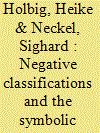| Srl | Item |
| 1 |
ID:
155816


|
|
|
|
|
| Summary/Abstract |
The spreading application of digital networks throughout China’s social, economic and political structures exposes the Communist Party to new weaknesses that are increasingly exploited by citizens and used by them to contest and restrain its power monopoly. The Party successfully counters these trends by employing alternative web tactics. To make sense of this dynamic, the paper proposes a new concept of power as shared weakness (ruò shì jūn zhān de lì liàng). The term refers to the inability of actors (from the most powerful to the least powerful) to exercise full control over the digitally networked environment in which they operate.
|
|
|
|
|
|
|
|
|
|
|
|
|
|
|
|
| 2 |
ID:
146637


|
|
|
|
|
| Summary/Abstract |
This article explains a cultural sociological approach to research on social inequality. “Cultural sociological” means that we do not regard social inequality as resulting only from a distributive order of goods, income and positions, but also from an evaluative order created and reproduced by the actions of social groups. Concerning the topic of this thematic issue, this means that, from a sociological perspective, we see “weakness” not only as the social vulnerability of actors and groups resulting from a lack of material resources, education and power, but also as an attribution and assessment which can have a variety of social consequences. “Weakness” can compel others to help the weak and defend their interests. But if the weak are to be protected and empowered, they must be identified as “weak” in the first place, and this act of identification can have paradoxical consequences. As we demonstrate with evidence from East Asia, the social designation as “weak” can have many adverse effects for the weak groups themselves, because it blames them for their own weaknesses and publicly condemns, disparages, or stigmatizes them. Based on an analysis of the situation of victims of the Fukushima disaster in Japan and of rural migrants and their offspring living in Chinese metropoles, we show how social designations of weakness can produce negative classifications that signal disrespect to weak actors and limit their opportunities for action.
|
|
|
|
|
|
|
|
|
|
|
|
|
|
|
|
| 3 |
ID:
123154


|
|
|